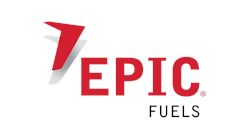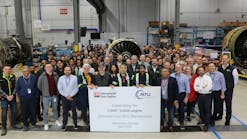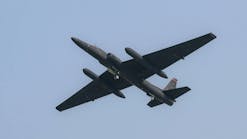September 2003
Runway and ramp incursions and incidents are usually
the result of a series of events taking place simultaneously in the efforts
necessary for quick aircraft turnarounds. Those on the ground need to remain
alert at all times to avoid situations that would put them or others in harm's
way. Many businesses, organizations, as well as the Federal Aviation Administration,
have programs in place to aid in this effort.
Definitions
Runway Incursion: The FAA defines this as being, "Any occurrence at an airport involving an aircraft, vehicle, person, or object on the ground that creates a collision hazard or results in loss of separation with an aircraft taking off or intending to take off, landing, or intending to land."
Types of runway incursions include: Pilot Deviation (PD), Operational Error (OE), which is caused by a tower controller, or Vehicle/Pedestrian Deviation (V/PD), which is any person or vehicle on an airport that causes a runway incursion.
In March, a startling report entitled Review of Air Traffic Management-related Accidents Worldwide: 1980-2001 presented at the European Aviation Safety Seminar in Geneva, Switzerland, revealed that collisions between aircraft and ground vehicles topped the list of accidents involving air traffic management. A whopping 68 percent involved aircraft that struck parked ground vehicles or other aircraft during taxi operations.
The FAA Runway Safety program offers guidance for all involved at the airport including pilots, controllers, as well as ground personnel. Current and historical data regarding runway incursions, Advisory Circulars, human factors information, as well as training videos and publications can be accessed from the FAA Runway
Safety website at www.faarsp.org. Good news came in August as the FAA announced
that the number of people, airport vehicles, and airplanes entering runways
by mistake declined by 17 percent last year from the previous year. FAA credited
new technology and a campaign to increase awareness of the problem.
FOD Fighters Unite!
Add to this mix of moving vehicles, aircraft, and personnel activity foreign object debris, which can cause foreign object damage. Both of these are known as FOD and both are undesirable to have anywhere near the ramp and ramp workers.
Norm Hogwood, former GSE/Safety Manager at Air New Zealand and now a Consultant with AeroGround Safety Services Ltd., also in New Zealand, offers this advice for those who fight the good fight on the ramp everyday.
"It seems that the industry is fighting a losing battle with FOD [Foreign Object Debris/Damage]. The amount of aircraft engine, tire, and fuselage damage caused by FOD is increasing exponentially with the increase in operations. There is a widespread lack of care on the part of those responsible for maintaining safe and clean movement and maneuvering surfaces and the safe disposal of rubbish appears to be the responsibility of 'somebody else.' And we are not talking solely about 'hard' FOD such as metal, stones, or wood. The ingestion of plastic into engine and auxiliary power unit (APU) intakes is very common. I have learned recently of an engine that suffered damage to the extent of $3.4 million after it sucked in a plastic bag. In another incident, an airline faced a repair bill of $150,000 when plastic was sucked into the APU. FOD awareness must be improved and the message must be enforced."
While the FAA has reported that runway incursions have decreased, the number
has yet to reach zero. Therefore, it is everyone's responsibility to go out
each day with the mindset that because incidents and accidents can happen in
an instant, it is critical to stay alert as well as keep current on proper procedures
to maintain safety on the ground.
RAMP HAZARDS IDENTIFY CLEAR NEED FOR DEFENSIVE DRIVING SKILLS
It was unanimous... fuelling operators, line service maintenance, and management alike described the traffic hazards as an opportunity for significant improvement in defensive driving techniques. Seemingly, others on the ramp had mastered the art of "Offensive Driving" and demonstrated little regard for the physics of tank truck operations: a 5,000 gallon truckload of jet fuel cannot stop on a dime. We needed to protect ourselves.
With digital camcorder in hand and editing
software loaded on the PC, a series of ramp traffic clips where shot and
edited into interviews with fuelling staff. The finished product was a
romping 2-1/2 minutes of site-specific hazard awareness training that
has received worldwide distribution throughout the Air BP airport operating
network. Lead Fuelling Operator Pete Ogden was quoted, "You really
get a sense of the chaos when the traffic activity is compressed.
Everyone seems to rush to service the inbound flights, with little regard
for basic driving courtesy."
Completing the series more Dulles-specific training videos are in the editing suite: "The Air BP Golden Rules," and "Manual Handling during Fuelling Operations" will be released shortly.
The objectives have been met.... no vehicle accidents since May and a safer environment for all ramp personnel.
- Thomas Herod, Health, Safety & Environmental Change Manager - AirBP
Resources
AeroGround Safety Services Ltd.
576 Oruarangi Road
Mangere, Auckland
New Zealand
+64-9-275-4292
[email protected]
Australasian Aviation Ground Safety Council
www.aagsc.org
BP Products North America Inc.
Dulles Airport
45061 Compass Court
Dulles, VA 20166
703-572-8775
FAAC, Inc.
1229 Oak Valley Drive
Ann Arbor, MI 48108
734-761-5836 o fax: 734-761-5368
www.faac.com
Federal Aviation Administration
Office Of Runway Safety
490 L' Enfant Plaza, Suite 7225
Washington D.C. 20024
www.faarsp.org
Flight Safety Foundation
Suite 300
601 Madison Street
Alexandria, VA 22314
703-739-6700o Fax: 703-739-6708
www.flightsafety.org
MARSS
5750 Cedarbridge Way
Richmond, B.C. Canada V6X2A7
604-207-9100 o fax: 604-207-9101
[email protected]
www.marss.org













